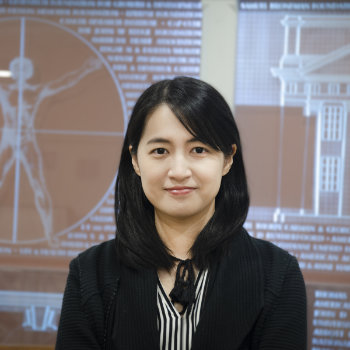Dr. Zhangli SuWritten by: Dawn Chen  Most of us are familiar with tRNAs, the essential adaptor molecules that help translate mRNA into proteins. But did you know that tRNAs also have many non-canonical functions? For instance, they can give rise to smaller tRNA fragments, which are highly abundant across species and play diverse roles in gene regulation. Meet Dr. Zhangli Su, a rising star who is studying these tiny yet powerful sequences. Dr. Su is currently an Assistant Professor of Genetics at the University of Alabama at Birmingham. Her lab, which opened its doors in July 2023, investigates the fascinating world of RNA modifications, particularly how m1A (1-methyladenosine) influences gene silencing functions of tRNA fragments. These modifications are found on various RNA substrates, including tRNAs and tRNA fragments, and their dynamic nature is just beginning to be understood. Dr. Su is excited to be at the forefront of this rapidly developing field. For Dr. Su, her research direction has been largely guided by her excitement for the projects and the quality of mentorship available. She obtained her Ph.D. in Cellular and Molecular Biology from the University of Wisconsin-Madison in John Denu’s lab, where she studied the interplay between histone reader domains and writer/eraser domains that frequently co-occurred on the same protein. Towards the end of her PhD, when she was looking for postdoc labs, she saw two fascinating papers on tRNA fragments in sperm mediating phenotype by paternal diet, which deeply intrigued her. This led her to pursue postdoctoral training in non-coding RNAs under the mentorship of Anindya Dutta at the University of Virginia, one of the earliest labs to identify tRNA fragments in human cells back in 2009. “I was very excited to investigate the biogenesis and functions of these interesting molecules,” Dr. Su said. “I am excited to find that RNA modifications can regulate gene silencing functions of tRNA fragments. Turns out RNA modifying enzymes share many similarities with histone modifying enzymes, so my PhD training came in handy!”
Dr. Su draws her scientific inspiration from her family. Her grandfather, a marine biologist, and her father, a microbiologist, instilled in her a deep appreciation for the natural world and a commitment to rigorous scientific inquiry. "Growing up, I was always fascinated by the different fish specimens and sketches in my grandfather’s place; he is a marine biologist and still went on field research trips in his 70s. His passion for the natural world ignited my curiosity and instilled a deep appreciation for persistent work." Not surprisingly, Dr. Su’s favorite RNA is tRNA. “I am totally in love with tRNA! tRNAs are both well-known and mysterious at the same time. For example, humans have 400+ tRNA genes in different isodecoder families, and it’s unclear what the function of the divergent gene sequences within each family is. Do some of them have functions outside of protein synthesis? Meanwhile, some Archaeal species have naturally split tRNA genes that remind me of the tRNA halves. The more I delve into the intricacies of tRNA biology, the more I am amazed by the unexplored possibilities.” Dr. Su’s favorite paper in the RNA journal is “tRNA fragments (tRFs) guide Ago to regulate gene expression post-transcriptionally in a Dicer-independent manner” by Canan Kuscu. When they were both postdocs in the Dutta lab, they worked closely as a team on this research. The paper showed that 3’ tRNA fragments can be over-expressed from their parental tRNAs and mediate microRNA-like gene silencing through Argonaute. Dr. Su’s journey is an inspiring blend of passion, persistence, and discovery. She is thankful for the mentors who have helped her on her career journey, especially her postdoc mentor Anindya Dutta for encouraging her to apply for the NIH K99/R00 grant. “It was daunting at first, but after rounds of revisions, attending grant writing workshops, and getting help from different mentors, I actually started to enjoy the grant writing process. I still remember the moment when I received the promising impact score and couldn’t believe it for a while. Having received the award had a huge impact on helping me stay focused on the academic path and less stressed about the future.” She is also grateful to her lab members (Abi, Jayden, Momo, Xisheng, and Nhi) for building the lab together in the past year. Follow her on Twitter at @suzhangli and visit her lab's website at Su Lab to keep up with her exciting research! |
